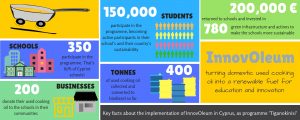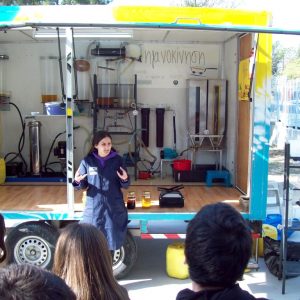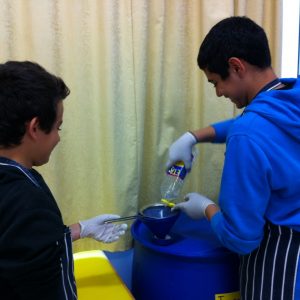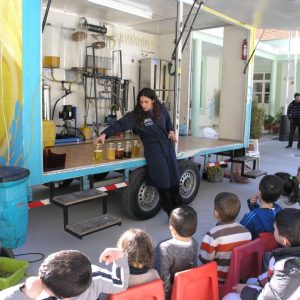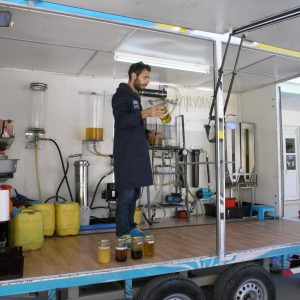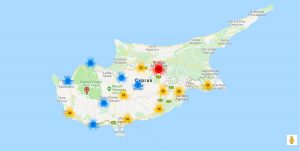
This project has received funding from the European Union’s Horizon 2020 research and innovation programme under grant agreement No 807317.
Turning domestic used cooking oil into renewable “fuel” for education and entrepreneurship
Navigate through the tabs below to see an Overview of this innovation project, and to find out more about the Challenge, our Success and the Future Opportunity.
We’d like to invite you to join us in something really special and unique.
We’ve developed a way where young school children, from all around the world, can actively participate in the future of saving and improving their environment.
A way where they can immerse themselves in the opportunities of making a positive impact on the planet, for themselves and for future generations.
A way where all their small collective individual efforts can add up to a huge impact on the shape of the environment of tomorrow.
Where they not only can directly contribute to important environmental change, but also have an exciting, in-depth and insightful environmental education about all aspect of the environment, and what they can do to make a difference.
It’s been said that: “It’s important that you actively participate in your own rescue.”
Well, we’ve found a way that enables all these young school children to participate in making a positive impact on their environment, and one that they can apply in a safe and secure manner.
A way that will enable the children, and their teachers, to make much more informed choices about their understanding of the environment and their environmental practices.
And the initial driving force behind their active participation?
The collection of their family’s used cooking oil, which they can collect at home and bring along to their school.
This will liberate children of all nations to actively participate in their own rescue.
Did you know that 854,000 tonnes of used cooking oil are produced from households, across the EU, every year?
And these 854,000 tonnes, are being directly disposed of down domestic household drains or thrown away into landfill, with a massive harmful and detrimental effect on our environment and our water systems.
So, what we want to do is stop this oil going down the drains and into the water networks, to stop it going into landfill sites, and to boost the available supply of biodiesel.
You see, this used cooking oil can easily be converted into biodiesel and other valuable products.
The EU biodiesel industry currently produces 11.6 million tonnes of biodiesel. However, the capacity of the sector is over 21 million tonnes. The collection and conversion of domestic UCO into biofuel could help close a part of this gap.
But, the biggest challenge for domestic UCO is the economic viability surrounding the logistics of its collection.
This is where the children and the schools can play their part in making that major impact on the global environment.
Not only that, but the children can do this in a fun, enjoyable, engaging, contributory, and practical way as an applied environmental education in action.
Through the children collecting their household used cooking oils, then bringing it to school, means the schools become central collection hubs.
It’s then collectively poured into large barrels, installed at their school, where these barrels can be easily pumped out by the oil convertors.
This makes its collection economically and logistically viable.
And for this, the school gets a share of the financial rewards for all the oil they collect, which can be invested in environmentally friendly practices, green infrastructure, and related activities, specifically to benefit the children and their school.
Plus, the children enjoy a heightened environmental education, through dedicated teaching support on environmental awareness, delivered at each school by us, and all free of charge. This includes a mobile information and education centre ‘caravan’ that travels to schools and public events for on-site conversion demonstrations and other technological devices relevant to energy efficiency, marine litter, and activities to combat climate change.
Can you imagine the impact this will have?
A way where school children can collect used cooking oil, actively participate in learning all about the environment and actively get involved in making a difference, with a real measurable impact on the environment, and all carried out in a way the children will never forget.
The financial returns allow ISOTECH to develop ever better educational materials and facilities to help the children broaden and heighten their awareness and knowledge of the environmental issues we all face.
Plus, it allows the children the opportunity to help tackle 2 of the 17 United Nations – Sustainable Development Goals and learn more about them too.
Over the last 5 years we have been successfully running this initiative across 350 schools in Cyprus.
The engagement and feedback from the Head-Teachers, Teachers and school children themselves, has been fantastic.
The children have been collecting oil from both their direct family and extended family, including across their local neighbourhoods too.
We even have 200 local businesses and restaurants donating their used cooking oils to their local school.
So far, 400 tonnes of used cooking oil have been collected, and 200,000 euro have been returned back to schools. As a result, 780 actions and activities to improve the sustainability of schools have been implemented.
And it’s also fully supported by the Cyprus Ministry of Education.
The map below shows the participating schools and businesses, together with information about the amount of UCO collected by each school.
Click on the map to see further details.
We intend to use a Social Enterprise Franchise Model to become an International Franchisor, based in Cyprus, and franchise the success we’ve had with Cypriot schools to all the nations and schools across the World.
For this we intend to work with Non-Government Organisation (NGO) in each country, as a Master Franchisee, who will then have territory Franchisees spread throughout each country.
Are you the Partner we are looking for?
Let me start by conveying the kind of partner you are.
You’re interested in making an impact on 5 of the 17 United Nations Sustainable Development Goals. The bold, global goals set out by the UN as essential to the future of humanity and our planet.
With the 5 goals in question being:
Goal #4 – Quality Education: To ensure inclusive and quality education for all and promote lifelong learning.
Goal #7 – Affordable and Clean Energy: Ensure access to affordable, reliable, sustainable and modern energy.
Goal #8 – Decent Work and Economic Growth:Promote inclusive and sustainable economic growth, employment and decent work for all.
Goal #12 – Responsible Consumption and Production: Ensure sustainable consumption and production patterns.
And
Goal #13 – Climate Action: Taking urgent action to combat climate change and its impact.
You’re interested in helping educate the young boys and girls of the world about the environment and climate change. And help them apply what they learn in a direct and beneficial way.
You’re interested in making a major social impact and one that will leave a legacy for generations to come.
You believe in Corporate Social Responsibility and the positive impact it can bring.
You’re happy to support a Social Enterprise Network of Non-Government Organisations (NGO’s) and engage with Education Minsters, Head Teachers, and classroom Teachers across many nations.
Potentially assisting over 100 million school children across 250,000 schools, to improve their education on environmental challenges and climate change.
We invite you to be a part of what we’re doing here with this purposeful, meaningful and vitally important opportunity to make a real difference, for the good of the planet and of the nations of the World.
ISOTECH has received a prestigious SME Instrument Phase I Grant by the European Commission to investigate the feasibility of this endeavour.
The views and opinions contained herein reflect the authors’ views. The Agency and the Commission are not responsible for any use that may be made of the information contained herein.
